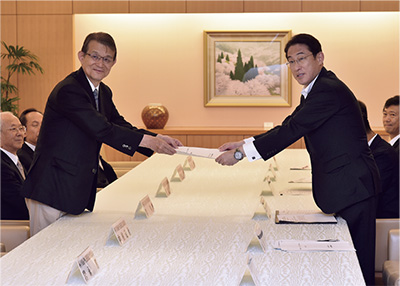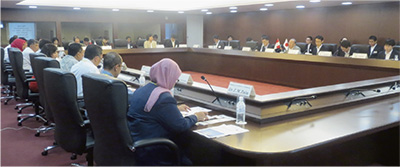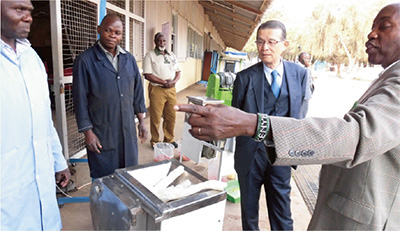Diplomatic Bluebook 2017
Chapter 3
Japan's Foreign Policy to Promote National and Worldwide Interests
3.Science and Technology Diplomacy
Prof. Teruo Kishi, who was appointed as Science and Technology Advisor to the Minister for Foreign Affairs by Foreign Minister Kishida in September 2015, supports the activities of the Foreign Minister from the perspective of science and technology, and provides advice on the utilization of science and technology in the planning and coordination of various foreign policies to the Minister and relevant divisions. He also takes part in public relations activities concerning Japan's science and technology diplomacy, while strengthening partnerships with Japanese and foreign stakeholders in the fields of science and technology.
Three sessions of the Advisory Board for the Promotion of Science and Technology Diplomacy, chaired by the Science and Technology Advisor to the Minister for Foreign Affairs, were held in 2016. Furthermore, at study groups organized by the Advisor on the four areas of Japan-U.S. cooperation, oceans/the Arctic, health, and international cooperation, involving experts and the relevant government ministries and agencies, the importance of evidence-based policy making was emphasized. As a result of these initiatives, the outcome document of the G7 Ise-Shima Summit supported efforts to enhance ocean observation for the science-based management of marine resources, and stated the importance of international cooperation in the area of medical data. The Advisor also submitted a recommendation to the Minister for Foreign Affairs toward the Sixth Tokyo International Conference on African Development (TICAD VI). This recommendation comprised the following two pillars: Improving Africa's science and technology level through human resource development, and applying research and development results to overall society. During TICAD VI in Kenya, the Advisor attended related events, visited local science and technology facilities, and exchanged views with concerned parties.
Along with Science and Technology Advisors from other countries including the U.S., the UK, and New Zealand, he also attended various international conferences and worked on network-building, through exchanges of opinions on the role of Advisors and ways of applying scientific knowledge to foreign policies.
Furthermore, Prof. Kishi also initiated a project to publicize technology and innovation through cooperation with the Cabinet Office and the Ministry of Foreign Affairs5 in Europe6, with the aim of enhancing the dissemination of information about Japan's prominent scientific and technological strength. In addition, he also widely disseminated information about Japan's initiatives in science and technology diplomacy at various fora in Japan and abroad, including the Symposium on Science and Technology Diplomacy held in Tokyo on May 24.
Japan has concluded 32 science and technology cooperation agreements with 47 countries/institutions, and organizes regular joint committee meetings with these countries based on the agreements, to engage in intergovernmental dialogue. In 2016, meetings were held with seven countries respectively: Sweden, Finland, Canada, the U.S., Indonesia, the UK, and Germany. With attendance by delegates from the relevant ministries and institutions, consultations were held on the current status of cooperation in diverse sectors, and on the future direction of cooperation. Japan has contributed to promoting science and technology exchange with the respective countries through participation in, and implementation of, the relevant events such as seminars and fora on related contents as well as tours of facilities. In particular, the meeting with Indonesia marked the first such meeting in 34 years. A director-level taskforce meeting was also held with the EU, where opinions were exchanged with a view to the next joint committee meeting.
With regard to multilateral initiatives, as a member of the Board of the International Science and Technology Center (ISTC) that supports research for peaceful purposes conducted by researchers on weapons of mass destruction from the former Soviet Union, Japan works together with the U.S. and the EU to provide support mainly for countries of Central Asia. Japan also participates in ITER projects.
 Prof. Kishi, Science and Technology Advisor to the Minister for Foreign Affairs, submitting the recommendations toward TICAD VI, “A More Prosperous Africa with the Power of Science, Technology and Innovation” to Foreign Minister Kishida (August 15, Tokyo)
Prof. Kishi, Science and Technology Advisor to the Minister for Foreign Affairs, submitting the recommendations toward TICAD VI, “A More Prosperous Africa with the Power of Science, Technology and Innovation” to Foreign Minister Kishida (August 15, Tokyo) Scene of the 2nd Japan-Indonesia Joint Committee Meeting on Science and Technology Cooperation (September 13, Tokyo)
Scene of the 2nd Japan-Indonesia Joint Committee Meeting on Science and Technology Cooperation (September 13, Tokyo)- 5 Project (known as âSIP Caravanâ) to introduce , the SIP (Strategic Innovation Promotion Program) , which is a new type of Japanese national project for science, technology and innovation, spearheaded by the Council for Science, Technology and Innovation (CSTI) as it exercises its headquarters function to accomplish its role in leading science, technology and innovation beyond the framework of government ministries and traditional disciplines by facilitating coordination among government, industry and academic entities under 11 themes, in order to lay the groundwork for future international cooperation, as well as for the international dissemination of Japan's research and development output, through cooperation with the Ministry of Foreign Affairs (diplomatic missions overseas).
- 6 Organized in Germany in June 2016, and in Austria, France, and the United Kingdom in October 2016.
Knowledge of science and technology is required to resolve many of the issues confronting the world, such as global environmental issues, infectious diseases, and responding to natural disasters.
How can we harness Japan's strength in science and technology to diplomacy? Advice concerning this question is expected to be brought about through the activities of Science and Technology Advisors, who serve as science experts in the Ministry of Foreign Affairs. To provide appropriate recommendations and advice, knowledge of 17 experts of Japan comprising the Advisory Board for the Promotion of Science and Technology Diplomacy, has been called into service to date. At the same time, there are high expectations in the scientific community for this advice and recommendations to ultimately contribute to the development of science and technology in Japan.
To harness Japan's strength in science and technology in diplomacy, it is important to adopt an approach of utilizing scientific knowledge and data in the formulation of diplomatic policies. This idea involves using Japan's outstanding technologies, collecting accurate and precise data, conducting analysis based on scientific evidence, and applying it to policies.
Through activities including joint research between Japan and other countries, as well as human resource development activities in developing countries, science and technology has many roles to fulfill in Japan's diplomacy. If Japan's scientific and technological prowess can be harnessed to achieving the Sustainable Development Goals (SDGs) adopted by the United Nations, it would mark a further achievement for Japan's diplomacy. To that end, I have been working to introduce Japan's efforts in science, technology, and innovations in relation to SDGs both at home and abroad, and considering ways of promoting international cooperation which are currently under review.
Building networks between Science and Technology Advisors and scientists from other countries is another important aspect of an Advisor's work. The number of countries that have established the Science and Technology Advisor system remains relatively small, and currently includes countries such as the U.S., UK, and New Zealand. In light of this situation, there has been much talk about bringing together the Advisors from each country to provide inspiration and encouragement for science and technology diplomacy across the world through the activities of the Advisors. Bringing together Advisors from different countries to engage in discussion can also contribute to identifying issues that Science and Technology Advisors should pay attention to, based on the situation in the international community and the science and technology sector at the time. We could say that expanding science and technology diplomacy in such manner is a new and interesting development in the world of diplomacy.
The consolidation and penetration of scientific knowledge within the Ministry of Foreign Affairs is also of great importance. In this regard, various initiatives have been put in place including seminars for the ministry officials to improve scientific literacy, and utilization of science and technology diplomacy network linking the Ministry with its diplomatic missions overseas to consolidate science and technology information from various countries, and to transmit Japan's science and technology to the world through such program as the Strategic Innovation Promotion Program (SIP) Caravan, to name a few.
 Science and Technology Advisor to the Minister for Foreign Affairs, Kishi, visiting the Jomo Kenyatta University of Agriculture and Technology (August 25, Nairobi, Kenya)
Science and Technology Advisor to the Minister for Foreign Affairs, Kishi, visiting the Jomo Kenyatta University of Agriculture and Technology (August 25, Nairobi, Kenya)As a science expert, by stepping into the field of diplomacy, which is a completely new world to me, I have gained new stimulus and excitement for myself. Of course, I also take pride in the fact that for the Government of Japan, the activities of Science and Technology Advisor are effectively strengthening Japan's diplomatic capabilities. I hope that Japan's science and technology will continue to contribute to Japan's diplomacy.

